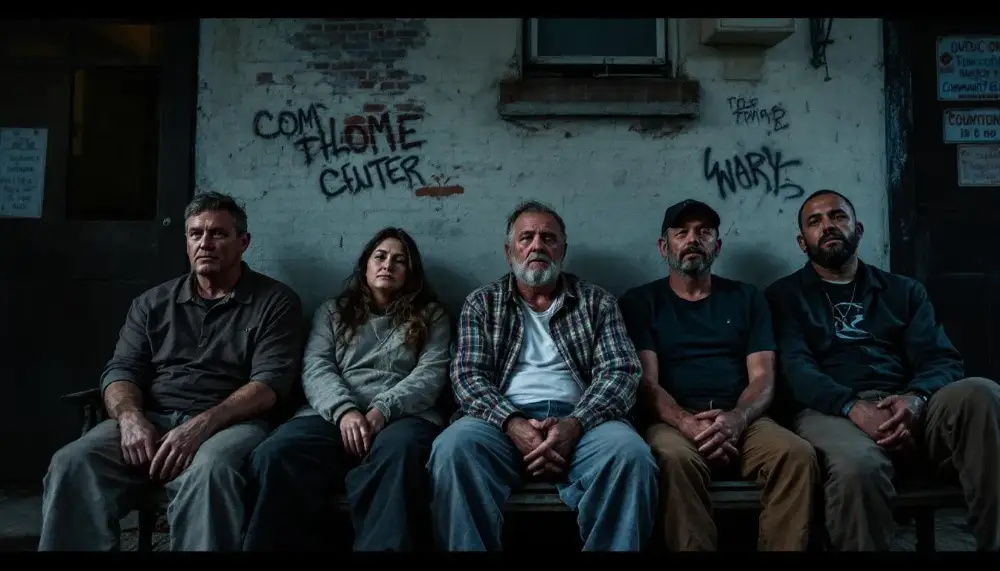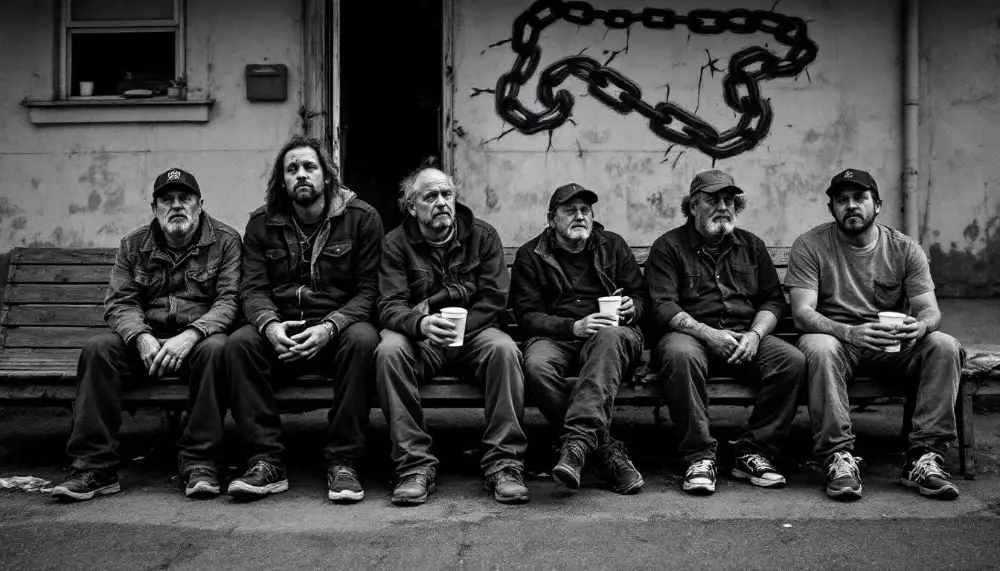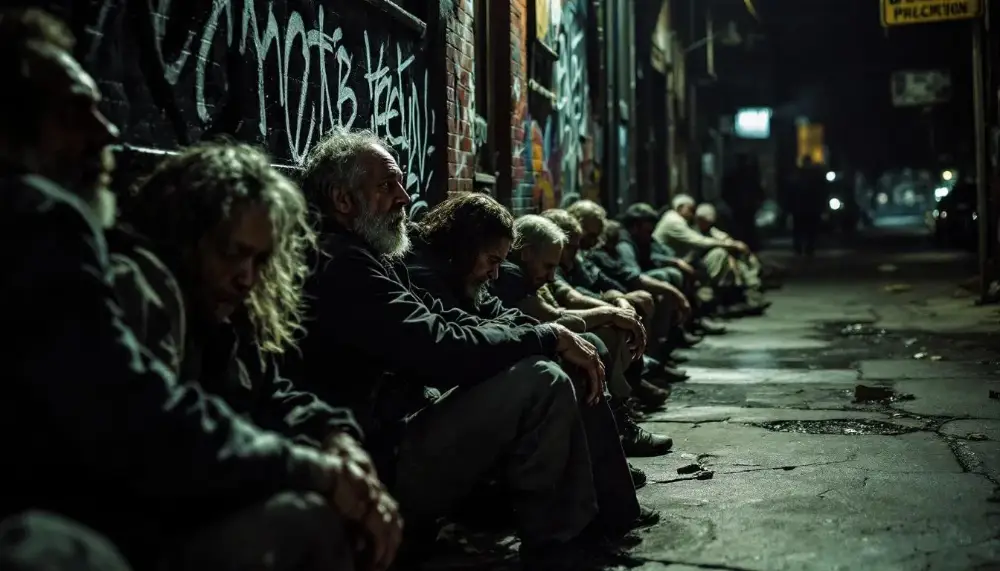
New Jersey Addiction Support
Resources and Options for New Jersey Addiction Treatment
Key Takeaways
- Approximately 1 in 10 New Jersey residents face some form of substance use disorder, necessitating robust public health interventions, access to addiction services, and individualized support systems.
- A comprehensive range of treatment options is available, including inpatient care, outpatient services, and medication-assisted treatment. Legacy Healing Center specializes in high-quality, trauma-informed care tailored to individual recovery journeys.
- Ongoing support services, such as group therapy, mental health care integration, and alumni programs, are essential for maintaining long-term sobriety.
Understanding Addiction in New Jersey

Data from the U.S. Substance Abuse and Mental Health Services Administration (SAMHSA) found that approximately 464,000 New Jersey residents (6.1% of those aged 12+) experienced a substance use disorder in the past year (SAMHSA/Valley Spring Recovery Center).
Addictions, including drug addiction, remain a critical public health issue in New Jersey, with various drugs contributing to the crisis. While state-funded resources such as those coordinated by DMHAS provide one path to care, they often refer to independent agencies that may vary in quality and approach.
Legacy Healing Center offers a private, nationally accredited alternative to public programs, specializing in trauma-informed, individualized care that addresses both substance use and its root causes. Our concierge-level services include luxurious accommodations, family integration support, and whole-person healing practices. Clients choose Legacy for a personalized, high-touch recovery experience unlike any traditional or state-funded model, benefiting from funding and coordination by human services agencies and Jersey’s local expertise.
Addiction affects not only individuals but entire communities, increasing healthcare costs, reducing productivity, and straining public systems. Legacy responds to this crisis by providing an evidence-based, holistic model of care built around long-term healing and clinical excellence. To effectively address the rising rates of addiction, comprehensive strategies are essential.
Substance Use Trends in New Jersey
- Alcohol Addiction: Alcohol remains a leading cause of treatment admissions, responsible for 37% of all entries in 2022. At Legacy Healing Center, we offer specialized treatment for alcohol use disorder, including trauma therapy, family support, and relapse prevention planning.
- Opioid Crisis: With opioids contributing to roughly 75% of overdose deaths, New Jersey has increased access to MAT through public initiatives such as the MATrx model. However, Legacy provides an enhanced version of this treatment approach by integrating MAT only when clinically appropriate and combining it with robust psychotherapy and frequent clinical oversight. This ensures clients receive a balanced, individualized path to recovery rather than a one-size-fits-all solution.
- Co-Occurring Disorders: Nearly 50,000 individuals struggle with both addiction and a mental health disorder. Legacy’s dual-diagnosis programs are led by licensed clinicians who specialize in treating depression, PTSD, anxiety, and related conditions alongside substance use.
Substances such as alcohol, opioids, and other drugs are involved in substance abuse throughout New Jersey, impacting public health, crime rates, and community safety.
Legacy’s New Jersey Addiction Treatment Programs

Legacy Healing Center offers a range of outpatient addiction treatment programs in New Jersey. Legacy Healing Center operates accredited addiction treatment centers in New Jersey, providing comprehensive care for adults seeking recovery. Our programs are designed to support individuals at every stage of their recovery journey, with personalized treatment plans and evidence-based therapies.
Legacy Healing Center’s Treatment Model
Legacy Healing Center provides a full continuum of care with a focus on clinical excellence, compassion, and long-term recovery. Our NJ drug rehab in Cherry Hill and Parsippany offer:
- Partial Hospitalization Programs (PHP): As a structured, day treatment partial care delivers intensive therapy and clinical support while allowing clients to return to a safe living environment at night. Ideal for those needing robust care without full residential treatment.
- Intensive Outpatient Programs (IOP): Flexible therapeutic care delivered several times per week. IOP is perfect for clients transitioning from PHP or balancing recovery with personal obligations like work, school, or caregiving.
- MAT (Medication-Assisted Treatment): Used only when clinically indicated, medication-assisted treatment at Legacy is paired with psychotherapy, individualized clinical assessments, and frequent reviews to ensure personalized, whole-person recovery, not just symptom suppression.
- Family Programming: Includes Family Weekends, couples therapy, and ongoing education to heal relational trauma and rebuild trust with loved ones.
- Aftercare & Alumni Support: Our aftercare model includes life skills coaching, virtual and in-person alumni events, peer support groups, and telehealth therapy to help persons in recovery stay connected and supported post-treatment.
Note: While Legacy does not offer inpatient detox at our Cherry Hill or Parsippany locations, we partner with trusted medical detox providers and offer referrals to ensure safe and seamless transitions into care.
Support Services and Long-Term Recovery Tools

Mental health is a cornerstone of overall well-being and plays a pivotal role in both the development and recovery from substance abuse disorders. In New Jersey, addressing mental health concerns is essential for individuals suffering from co-occurring disorders, where mental health issues and substance use disorder intersect. Many patients find that untreated anxiety, depression, or trauma can fuel substance abuse, making integrated mental health services a vital part of any effective treatment plan.
Modern treatment options in New Jersey, such as medication-assisted treatment and dual diagnosis, are designed to support both mental health and addiction recovery. Our luxury New Jersey addiction treatment programs offer:
- Group Therapy: Led by licensed therapists using evidence-based modalities such as CBT, DBT, and TF-CBT, offers a supportive environment where patients can share experiences, build coping skills, and foster a sense of community
- Individual Counseling: Focused on trauma resolution, inner child work, relapse prevention, and identity rebuilding.
- Mental Health Integration: Psychiatric support available for anxiety, depression, and PTSD, led by Dr. Ash Bhatt, our Chief Medical Officer.
- Holistic Therapies: Includes art therapy, yoga, spiritual support, and nutritional counseling to support mind-body healing.
- Harm Reduction Within a Recovery-Centered Model: While we recognize the importance of harm reduction tools like naloxone in public health, Legacy’s approach emphasizes full-spectrum recovery care, integrating life skills, therapeutic accountability, and long-term healing, not just risk mitigation.
By combining evidence-based therapies with compassionate care, health professionals help individuals sustain recovery and lead a better life. Addressing mental health alongside substance use not only improves treatment outcomes but also empowers individuals to reclaim control over their lives and move forward with confidence.
Role of Loved Ones in Recovery
The support of loved ones—family, friends, and close community members—can make a profound difference in the recovery journey for individuals facing substance abuse disorders in New Jersey. Many individuals struggling with addiction rely on their loved ones for encouragement, motivation, and emotional stability. A strong support system helps patients stay focused on their recovery goals and provides the reassurance needed to navigate the challenges of treatment.
Active involvement from loved ones, such as participating in therapy sessions and attending support groups, is crucial for effectively addressing addiction. These collaborative efforts not only help patients feel less isolated but also foster understanding and healing within the family unit. In New Jersey, treatment programs often encourage family participation, recognizing that recovery is most successful when everyone works together. By offering compassion, accountability, and ongoing support, loved ones play an essential role in helping patients address substance abuse, overcome obstacles, and build a foundation for lasting recovery.
Access to New Jersey Substance Abuse Disorder Programs

Legacy Healing Center offers comprehensive support for individuals seeking substance abuse disorder programs in New Jersey. The center provides financial planning assistance to help make addiction services more affordable and accessible. Legacy Healing Center strives to ensure that individuals have the ability to access treatment services regardless of financial limitations.
Access and Affordability
Legacy Healing Center accepts most major PPO insurance plans and offers financial planning support. While we are a private facility, our admissions team can guide clients through verification of benefits and connect them to clinical partners for detox when needed.
For those who qualify, public programs like ReachNJ remain available as part of New Jersey’s broader treatment infrastructure. However, Legacy Healing Center represents an alternative path, ideal for individuals seeking a customized, trauma-informed, and holistic recovery model in a luxury setting.
We also welcome out-of-state clients and assist with travel arrangements for those seeking treatment in our NJ, California, or Ohio locations.
Important Considerations
- Not all facilities listed in public directories like ReachNJ or DMHAS are accredited or clinically supervised. Legacy Healing Center meets the highest standards of quality assurance, clinical oversight, and professional licensure.
Prevention and Education Efforts
Harm Reduction Strategies in New Jersey
New Jersey has embraced a range of harm reduction strategies to address the ongoing challenges of substance abuse and addiction. Rather than focusing solely on abstinence, these programs aim to reduce the risks associated with drug and alcohol use, ultimately saving lives and improving public health. Initiatives such as needle exchange programs and widespread access to naloxone have proven effective in preventing overdose deaths and limiting the spread of infectious diseases.
Beyond these direct interventions, New Jersey’s harm reduction approach includes robust education and outreach efforts, connecting individuals to vital treatment services and support networks. Referrals to addiction treatment programs, counseling, and healthcare services ensure that those struggling with substance abuse have access to the help they need. By prioritizing harm reduction, New Jersey is able to address the realities of substance use, provide compassionate care, and create pathways to recovery for its residents. This comprehensive focus not only reduces the negative impact of addiction but also fosters healthier, more resilient communities across the state.
Community and Partnerships
Legacy is available to partner with HR departments, educators, and community leaders for:
- On-site educational workshops
- Family system interventions
- Clinical training for workplace wellness
- School-based prevention programs
Legacy Healing Center incorporates the latest research into its prevention and education programs to ensure evidence-based outcomes.
Success Stories and Recovery Journeys

Recovery is not a linear path—it’s a deeply personal process shaped by trauma, resilience, and community. At Legacy Healing Center, we witness lives transformed every day through compassionate care, clinical excellence, and an unwavering belief in each client’s potential.
Real Recovery Stories
Anthony, a 24-year-old from Camden, NJ
Anthony struggled with heroin use that began after a sports injury in high school. After several failed detox attempts in local programs, Anthony enrolled in Legacy’s Cherry Hill facility. Through Partial Hospitalization, trauma-informed therapy, and structured recovery coaching, Anthony found stability. His parents participated in Family Weekend, helping to rebuild strained trust. Today, Anthony is over 18 months sober and studying kinesiology at a nearby college.
“Legacy didn’t give me a quick fix—they gave me the foundation for a new life,” he says.
Stephanie, a mother of two from Bergen County, NJ
Stephanie had battled alcohol addiction for years. After multiple short-term treatment attempts in northern New Jersey, she realized that none had addressed her underlying trauma. At Legacy Healing Center’s Cherry Hill location, she was paired with a TF-CBT-trained therapist and began participating in family therapy sessions. Her daughters attended Legacy’s Family Weekend, where they rebuilt communication in a safe, supportive space. Today, Stephanie is sober, managing anxiety with clinical support, and mentoring other mothers in recovery through Legacy’s alumni network.
“Legacy didn’t just help me recover—they helped me become the mom I always wanted to be.”
Mike, a 41-year-old financial executive from Princeton, NJ
Mike became dependent on prescription painkillers following a back surgery. As his addiction deepened, so did his depression. At Legacy Healing Center, Mike underwent psychiatric evaluation and medication management with Dr. Ash Bhatt, while also attending yoga, nutrition sessions, and grief therapy. He transitioned from PHP to IOP, and eventually to outpatient alumni support. Mike is now coaching other professionals in recovery and volunteering with a New Jersey mental health nonprofit.
“Legacy treated me with dignity when I had forgotten how to treat myself that way.”
Jasmine, a 32-year-old artist from Newark, NJ
Jasmine came to Legacy after relapsing at a public facility that lacked trauma support. At Legacy’s Cherry Hill campus, she was paired with a licensed female clinician trained in TF-CBT. She connected deeply with expressive therapies like art and movement. With ongoing aftercare, Jasmine has maintained her sobriety for over a year and recently hosted her first solo exhibit showcasing her healing journey.
“Legacy helped me reconnect with who I was before the trauma—and who I’m becoming now.”
David & Maria, a married couple in their 30s from Toms River, NJ
David and Maria were both struggling with substance use—methamphetamine and alcohol respectively. They entered Legacy’s care through separate PHP tracks while participating in joint couples therapy and weekend family programming. Their treatment included communication coaching, trauma therapy, and support with rebuilding parenting routines. Today, they’re sober, employed, and giving back by speaking at Family Weekends to support other couples.
“Legacy helped us heal as individuals so we could grow together again.”
These stories reflect not only the strength of the human spirit but also the power of clinical excellence, relational support, and trauma-informed care. Wherever you’re coming from, geographically or emotionally, Legacy Healing Center is here to help you find your way forward.
Summary
New Jersey offers a diverse array of recovery pathways, but not all treatment is created equal. Legacy Healing Center provides high-quality, trauma-informed care tailored to individual needs, supported by expert staff and a robust clinical infrastructure. Our use of evidence-based practices like TF-CBT, DBT, and trauma resolution therapies—combined with concierge-level comfort, family integration, and lifelong alumni support—ensures clients receive the most complete and compassionate care possible. Whether you’re in crisis or ready to take the next step, our team is here to walk beside you every step of the way.
Frequently Asked Questions
What are the most common substance use disorders in New Jersey?
The most common substance use disorders in New Jersey include alcohol addiction, opioid use disorder (including heroin and fentanyl), and stimulant misuse. At Legacy Healing Center, we regularly treat clients facing these challenges—often alongside co-occurring mental health conditions like anxiety, depression, or PTSD—using trauma-informed, evidence-based approaches to support lasting recovery.
What types of treatment programs are available in New Jersey?
Treatment options in New Jersey vary widely. At Legacy Healing Center, we provide a full continuum of care, including Partial Hospitalization Programs (PHP), Intensive Outpatient Programs (IOP), and outpatient aftercare. We offer Medication-Assisted Treatment (MAT) when clinically appropriate, and work closely with trusted detox and inpatient partners for seamless transitions into our program. Each treatment plan is individualized to support long-term recovery and wellness.
How can individuals without insurance access addiction treatment in New Jersey?
While state-funded programs like ReachNJ provide resources for those without insurance, Legacy Healing Center primarily works with private PPO insurance plans and offers personalized financial guidance to help individuals understand their coverage and options. For those seeking a high-quality, clinically supervised recovery experience, Legacy offers a level of care that goes beyond what most public programs can provide. Those with Medicaid or Medicare are encouraged to visit FindTreatment.gov for government-funded drug rehabs and low-cost resources for addiction treatment.
What role do community and peer support groups play in addiction recovery?
Community and peer support groups are vital to sustaining long-term recovery. At Legacy Healing Center, we incorporate peer support into our programming and provide access to an active alumni network that extends far beyond treatment. These connections—rooted in shared experiences and ongoing encouragement—help clients build resilience, stay accountable, and feel less alone on their recovery journey.
How does New Jersey address the opioid crisis?
New Jersey addresses the opioid crisis through a combination of public health strategies, including harm reduction initiatives, prescription monitoring, and expanded access to Medication-Assisted Treatment (MAT). Legacy Healing Center contributes to this effort by providing trauma-informed MAT services (when clinically appropriate), individualized treatment plans, and comprehensive aftercare that addresses both the physical and psychological drivers of opioid addiction, empowering clients to break the cycle and rebuild their lives.
Does Legacy Healing Center offer detox in New Jersey?
While we do not offer inpatient detox at our Cherry Hill or Parsippany locations, Legacy partners with trusted detox providers to ensure clients begin their recovery safely and supported. We also operate a luxury detox center in California for those seeking a premier detox experience.
What insurance does Legacy accept?
We work with most PPO insurance plans and can help you verify your benefits quickly and confidentially.
How does Legacy approach dual diagnosis?
We specialize in treating co-occurring disorders with a combination of clinical therapy, psychiatric care, and holistic support. For individuals whose primary concern is mental health, our Ohio-based mental health treatment center offers luxury dual diagnosis care in a setting designed for mood and trauma stabilization.
What makes Legacy different from state-funded programs?
Legacy offers a luxury-level, trauma-informed approach with private settings, advanced therapies, highly credentialed staff, and a strong alumni network—not a one-size-fits-all public system.
How do I get started? Call our admissions team 24/7 at 888-534-2295 or verify your insurance online to take the first step toward healing.






 Verify Insurance
Verify Insurance